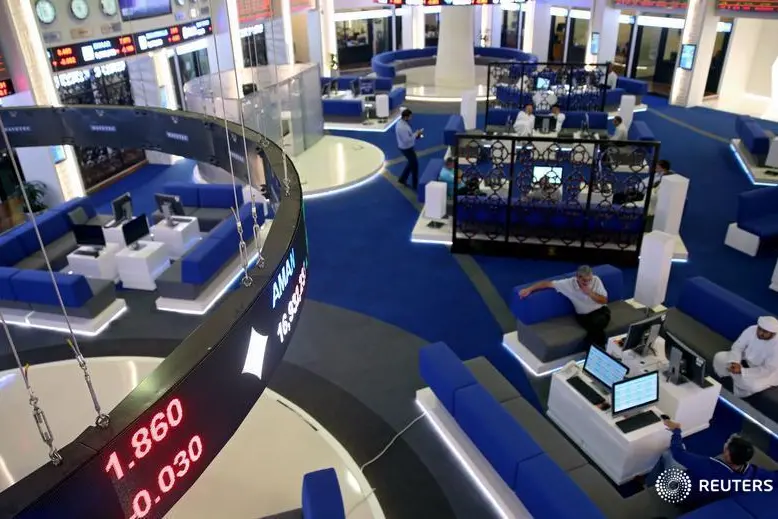PHOTO
DUBAI- Middle East fund managers have become more cautious about investing in regional bonds while ambitious economic development plans in Saudi Arabia have increased interest in equities there, a monthly Reuters poll shows.
Twenty-three percent of regional funds expect to reduce their allocations to fixed income in the next three months while 8 percent expect to increase them, according to the poll of 13 leading managers conducted over the past several days (for full poll results, click).
That is a shift from last month's poll, when 15 percent expected to increase fixed income allocations and 15 percent foresaw reducing them.
After a bull market for much of this year, regional bond prices have shown signs of pulling back in recent weeks, partly in anticipation of additional supply as governments and companies borrow to compensate for low oil prices.
The yield of the Saudi Arabian government's U.S. dollar bond maturing in 2026, for example, has risen 32 basis points since early September, after a downtrend that took it a full percentage point lower in the previous 10 months.
"We are reducing allocation to regional fixed income due to prices reaching highs and to the expected increase in interest rates in the U.S.," said Talal Samhouri, head of asset management at Qatar's Amwal.
Funds remain moderately positive towards regional equities overall, but sentiment has improved significantly towards Saudi Arabia, where 31 percent of managers now expect to raise allocations and 8 percent to reduce them. That compares with ratios of 15 percent and 31 percent last month.
Saudi Arabia hosted an international investment conference last week to present plans to open its markets wider to foreign capital and launch economic development projects, such as a $500 billion business zone extending into Jordan and Egypt .
Although many investors remain sceptical of Riyadh's ability to implement or afford all of its plans, others think the plans will benefit shares in individual Saudi companies, especially if oil prices maintain recent gains and stay near $60 a barrel.
And while the Saudi economy is expected to shrink this year and grow only marginally in 2018, some managers are starting to look towards a recovery in 2019.
"The ongoing economic, regulatory and social reform in Saudi Arabia will create attractive investment opportunities for patient, long-term investors," said Sachin Mohindra, portfolio manager at Abu Dhabi's Invest AD.
"A number of listed firms will be huge beneficiaries of a higher growth and consumption demand uptrend over the next 18 to 24 months - especially companies that are restructuring their business models and balance sheets to adapt aggressively to the new normal."
Funds have also become more positive towards Egyptian equities, the poll shows. The Egyptian stock index has hit record highs in the past few weeks; a senior International Monetary Fund official told Reuters this week that the country's economic reforms were having positive results.
Twenty-three percent of managers now expect to raise allocations to Egypt and 8 percent to reduce them, compared with ratios of 15 percent each last month. (Reporting by Andrew Torchia, editing by Larry King)
© Reuters News 2017
Twenty-three percent of regional funds expect to reduce their allocations to fixed income in the next three months while 8 percent expect to increase them, according to the poll of 13 leading managers conducted over the past several days (for full poll results, click).
That is a shift from last month's poll, when 15 percent expected to increase fixed income allocations and 15 percent foresaw reducing them.
After a bull market for much of this year, regional bond prices have shown signs of pulling back in recent weeks, partly in anticipation of additional supply as governments and companies borrow to compensate for low oil prices.
The yield of the Saudi Arabian government's U.S. dollar bond maturing in 2026, for example, has risen 32 basis points since early September, after a downtrend that took it a full percentage point lower in the previous 10 months.
"We are reducing allocation to regional fixed income due to prices reaching highs and to the expected increase in interest rates in the U.S.," said Talal Samhouri, head of asset management at Qatar's Amwal.
Funds remain moderately positive towards regional equities overall, but sentiment has improved significantly towards Saudi Arabia, where 31 percent of managers now expect to raise allocations and 8 percent to reduce them. That compares with ratios of 15 percent and 31 percent last month.
Saudi Arabia hosted an international investment conference last week to present plans to open its markets wider to foreign capital and launch economic development projects, such as a $500 billion business zone extending into Jordan and Egypt .
Although many investors remain sceptical of Riyadh's ability to implement or afford all of its plans, others think the plans will benefit shares in individual Saudi companies, especially if oil prices maintain recent gains and stay near $60 a barrel.
And while the Saudi economy is expected to shrink this year and grow only marginally in 2018, some managers are starting to look towards a recovery in 2019.
"The ongoing economic, regulatory and social reform in Saudi Arabia will create attractive investment opportunities for patient, long-term investors," said Sachin Mohindra, portfolio manager at Abu Dhabi's Invest AD.
"A number of listed firms will be huge beneficiaries of a higher growth and consumption demand uptrend over the next 18 to 24 months - especially companies that are restructuring their business models and balance sheets to adapt aggressively to the new normal."
Funds have also become more positive towards Egyptian equities, the poll shows. The Egyptian stock index has hit record highs in the past few weeks; a senior International Monetary Fund official told Reuters this week that the country's economic reforms were having positive results.
Twenty-three percent of managers now expect to raise allocations to Egypt and 8 percent to reduce them, compared with ratios of 15 percent each last month. (Reporting by Andrew Torchia, editing by Larry King)
© Reuters News 2017





















